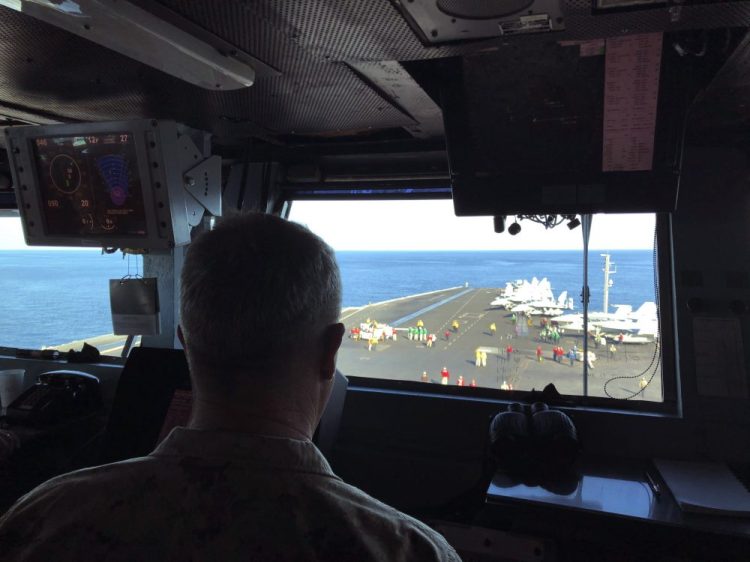ABOARD THE USS TRUMAN — A month after the U.S. strike that killed Iranian Maj. Gen. Qasem Soleimani, Iran’s military is no longer on a heightened war footing, but the United States continues to brace for further retaliation, a senior military official said Sunday.
Gen. Kenneth “Frank” McKenzie, who heads U.S. Central Command, said Iran had “de-escalated” its ballistic missile force and brought its air defense forces back to a “normal state of readiness” following its retaliatory strikes on bases housing U.S. troops in Iraq.
Speaking during a visit to the USS Truman, an American aircraft carrier conducting operations in the northern Arabian Sea, McKenzie said that Iran’s maritime forces likewise had displayed a “fairly normal” level of activity in recent weeks.
American officials have voiced concern about further attacks from Iran since the Jan. 7 ballistic missile strikes in Iraq. Those attacks, the first direct, overt military attack by the Iranian government, did not kill any U.S. troops but resulted in a spate of traumatic brain injuries.
U.S. officials have also blamed Iranian-linked militias for smaller-scale rocket or mortar attacks on American facilities in Iraq since then.
McKenzie said he believed Iran was still “digesting” the impact of the Trump administration’s decision to kill Soleimani, a figure of unparalleled influence whom U.S. officials have described as instrumental in the growth of Iran’s network of armed proxy groups across the Middle East.
President Trump, who has identified Iran as a major threat to the United States, pulled out of the previous administration’s nuclear deal and has subjected Tehran to a “maximum pressure campaign” that has included punishing sanctions.
“I think Iran has seen that we do have will and that we’re willing to take action in our own interests,” McKenzie said. “We’re not going to endlessly be the recipient of their actions.”
Some American allies feared that the Soleimani strike would tip the region into destabilizing conflict.

Marine Gen. Frank McKenzie, top U.S. commander for the Middle East, right, listens as Lt. Maguel Brooks, the USS Harry S. Truman’s handler, left, explains the movement of aircraft on the aircraft carrier’s flight deck, Saturday on board the USS Harry S. Truman in the North Arabian Sea. Lolita Baldor/Associated Press
During an overnight visit to the carrier, McKenzie spoke with commanders, sailors and aviators about their goal of deterring further Iranian actions against the United States and its partners.
The carrier is among the additional military assets McKenzie has secured for his area of command since last spring amid events that military officials characterize as Iranian provocations. It brings with it roughly 5,000 personnel and an embarked air wing boasting more than 70 aircraft, including the F-18 Super Hornet and EA-18G Growlers. Other ships operating with the Truman, the flagship for the Navy’s Carrier Strike Group Eight, include destroyers and cruisers.
Speaking to sailors on Saturday via the ship wide-speaker system, McKenzie addressed the ongoing tensions with Iran. “You’re here because we don’t want a war with Iran,” he said. “I may need you to fight. I hope I don’t.”
“But one thing I know for sure just from what I’ve seen so far, this ship, this crew and this air wing will be ready if I need you,” he said.
Capt. Kavon “Hak” Hakimzadeh, who commands the USS Truman, said the ship had made preparations to conduct kinetic operations following the Soleimani strike but was not ordered to do so.
The Truman, which left its home port in Virginia in November, is conducting training exercises as it navigates waters off the coast of the Arabian peninsula.
While Iran has conducted no major direct attacks since the missile strikes, U.S. officials say they believe it may attempt to do so at a later date. McKenzie said it remains difficult to ascertain the intentions of Iranian leaders at this moment.
“You know, we went through a period of quiet before the Aramco attack in September. And I always remember that when I think about Iran’s capability for action,” he said, referring to a bold missile and drone assault on Saudi oil facilities that Washington and Riyadh blamed on Tehran. “That’s very much in my mind as I think about what they are capable of doing, when they might do it and why they might do it.”
Hakimzadeh, who was born in the United States and moved to Iran as a young child before returning after the 1979 revolution, said his cultural familiarity and language skills may be an asset at a time when the U.S. military heightens its focus on Iran.
“It probably gives me a little bit … (of) cultural insight into what 80 million people think,” he said.
Comments are not available on this story.
Send questions/comments to the editors.


